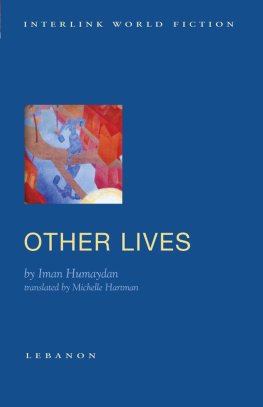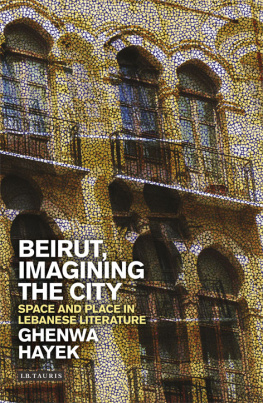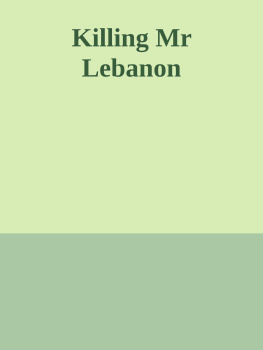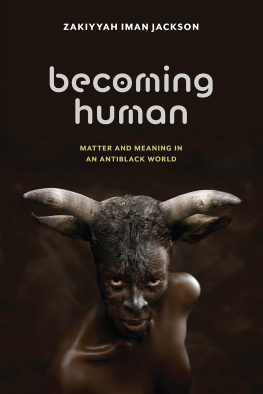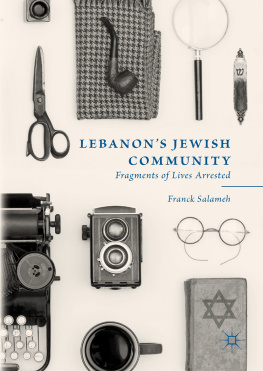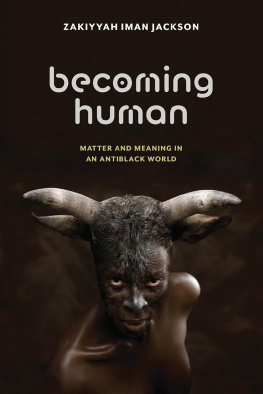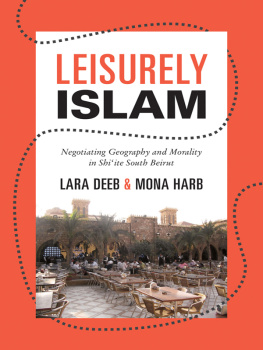For Inaam and May,
eternally here even though theyre gone
When will you be back home?
He asks me on our way to the Mombasa airport. I dont say that I am coming back. I dont say that Im leaving. I only say that I miss Lebanon. I know that longing is not for a specific place. Its for whats inside myself that Im losing everyday, for what I lose while away, for what Ive created from the images Ive preserved in my head for so long. Its as though nothing is left of them now More than fifteen years have passed since I left. I know that by going back to Beirut, I wont retrieve what Ive lost. Instead Ill simply confirm my loss. Ill confirm that what Ive been missing is in my head, only in my head, and I wont be able to convey it to him.
I leave Chris behind. And I leave his letter to me on my bedside table, without opening it. I know whats inside: money I dont want and a question about when Ill come back to him. Since weve been married, hes left me money in envelopes. Our hands have never touched, not even once, when hes given me money.
The day before my trip from Kenya to Lebanon, Chris is busy in his laboratory when I call him. His assistant answers. I hang up so that Chris can call me back a few moments later. Hes so completely taken up with what he wants to say that he doesnt even ask what I want. In an excited, anxious voice almost crying he informs me that hes gotten amazing results from the experiments he began a year ago. Of course hes happy with the results of his experiments. But his happiness doesnt make me forget either my decision or my anxious desire to pack and lock my suitcases and put them by the door. I open an empty suitcase and without thinking put some clothes and other things in it. I start by opening the drawers in my wardrobe, take out my underwear, cotton t-shirts and jeans. After I pile them up on the bed, I think its too much I should get used to traveling lighter.
I tell myself that the airplane is taking off tomorrow morning at eight, so I have to be at the airport at six. This means I have to wake up at four in the morning its already past midnight and I havent slept yet. Im going to travel first from Mombasa to Nairobi. I dont know how long Ill have to wait in the airport there until the plane carries me to Dubai and then to Lebanon. Chris will accompany me on my journey as far as the Nairobi airport. Then hell come back to Mombasa where our house and his work are. I wont miss anything. This is what I tell myself when I visit the rooms of the house where Ive lived for eleven years and havent left except for a quick trip to Adelaide every year, where my unbalanced father, Salama, and my silent mother, Nadia, live. Or for a short break to South Africa. I dont leave him except for intermittent weekend trips. I used to travel from Mombasa to Nairobi to pick up things that Olga sent me from Beirut. The English-language lessons dedicated to eradicating illiteracy that I used to give at UNICEF schools in Mombasa were not enough to fill periods of time as vast as the Kenyan plains, nor were the private Arabic lessons I used to teach. Ive never gotten to know Kenya, despite going as a tourist on organized trips through the Kenyan mountains, the surrounding savannahs and to its parks and wildlife reserves.
Beirut How faraway it is now. How many lives have I lived since I left it? I think while closing my second suitcase, pulling it toward the door of the house to leave it there. Did I live many lives or only one life that was enough for many women?
Questions I dont know how to answer. Im aware that it didnt take me long to realize that ever since I left Beirut my life changed. As soon as I arrived in Australia with my incomplete family, everything changed even the names of holidays and when they fall. The Christmas holiday changed into the summer holiday in Adelaide, the Australian city where I lived for four years before I got married and moved to Kenya. The date of winters arrival changed. Winter started coming in July.
We wouldnt have chosen Adelaide, except that my mothers brother Yusuf lived there. He left Lebanon before the civil war started. He was an active member of the Syrian Nationalist Party and participated in the coup of 1961, fleeing before the Lebanese army could put him in prison. An Australian man whom he met when he was training at the Tiro, the shooting range near the airport, helped him flee. He arranged travel for him first to Cyprus and from there on to Australia. I was five years old at the time. But I feel as though I can still remember my mother Nadias fear and worry about her only brother. Perhaps this was the first shock she ever had, long before my brother Bahas death, when she received the false report of her brother Yusufs arrest and liquidation. That was before she learned the truth about his rescue and escape from the country.
Nadia remembers the past in relation to the incidents that marked our lifetimes. She tells me that I was born on the day of the tripartite military aggression against Abdel Nassers Egypt in 1956 and that she was terrified of losing me while I was still a fetus in her belly on the day of the earthquake in Lebanon which cracked open many houses in the village, including her parents house in Hasbaya. She says that my brother Baha was born after the events of 1958 in Lebanon, when my father was in prison. She also says that my uncle Yusuf, her brother, left the country to travel abroad a few days after the coup of 1961. Nadias no different than my grandmother Nahil, my fathers mother, who sees dates of public importance in the family tree before she sees the names of individuals, to say nothing of the fact that her memory would recall any event in history before it would come up with my date of birth or even that of Salama, i.e., my father. Its as though the individual in my family has no story unless the beginning of her or his life can be associated with an important date in history. Ive often believed that our destinies are linked to these dates that describe our lives, the link mysterious, hard to untangle or reveal.
I dont know if what I remember of my uncle Yusuf is what I saw and experienced myself or if the stories about him that his sister Nadia, my mother, told made me invent a memory that grew up with me and never left. I believe that I remember the day my uncle was arrested but my grandmother Nahil tells me that I was very little and its impossible that I could remember. She tells me that I hadnt even completed my fifth year of life yet. Despite this, whenever I think about my uncle, I can imagine how angry he mustve been the night before the coup how he wouldve cursed the government and the state, denouncing so many of its members as traitors.
My uncle Yusuf arrived in Australia and lived in Paradise, one of the small suburbs of Adelaide. I found the name interesting after I learned that the largest cemetery and the first crematorium in the area were located near it. This is also where the Druze who immigrated to Australia built their first cemetery. Perhaps they chose this suburb for its name, which to them means that paradise is always found on earth. Or that its a dream deferred, equidistant between earth and heaven.
We had to live in my uncles house when we arrived at the beginning of 1980. I hadnt seen my uncle since I was a small child. He seemed like any Anglo-Saxon whod been born and raised in Australia, especially with the broad Australian accent that hed adopted soon after marrying an Australian woman who worked in an office for immigrants and refugees. Hed bought a house in Adelaide and didnt move from one place to another like most of the Lebanese who arrived on the continent before and during the war. When we emerged into the arrivals hall at the Adelaide airport, my uncle ran toward us, hugging my mother for a long time and crying while he asked her how she was. She said a few incomprehensible words, also choking on her tears. He started reminding her of things that she seemed to have forgotten or things whose details may have been buried under the weight of other memories that forced her to be silent. My mother loosened the knot around her silence while hugging my uncle, murmuring a few words, her eyes filling with tears. She began talking and spoke for a few minutes and then returned to the silence that shed chosen from the moment of my brothers death. From then on, from the time of our arrival in Australia, it seemed that her silence began to wear her out as though what shed chosen for herself began to exhaust her.

